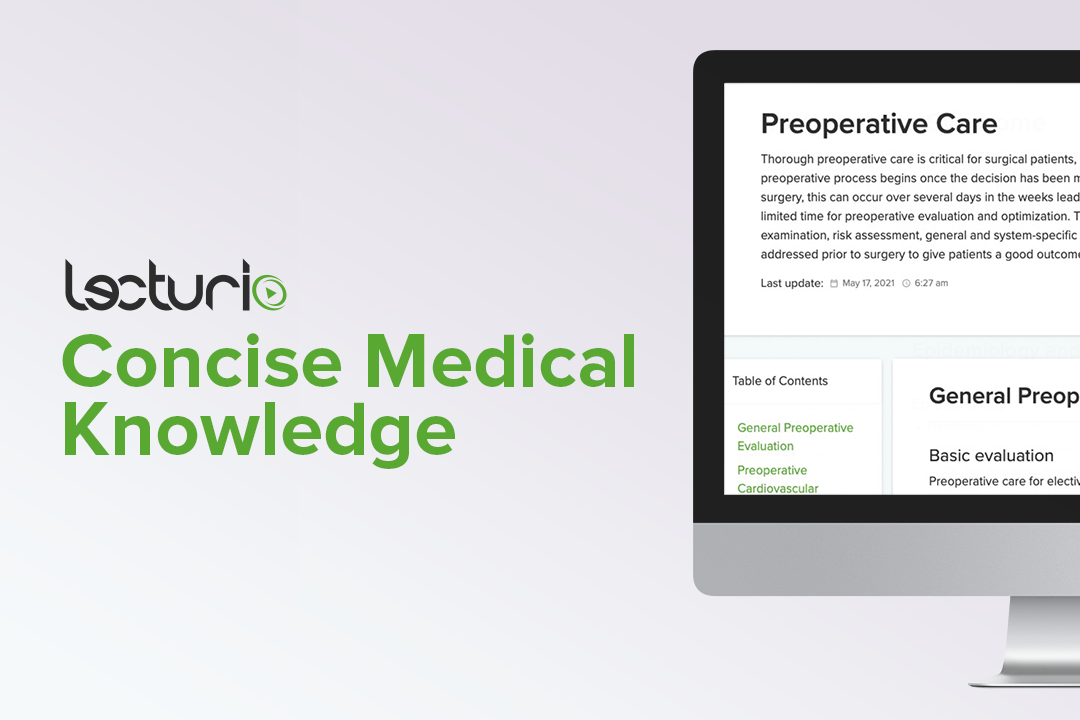Playlist
Show Playlist
Hide Playlist
Perioperative Medicine – The Future of Anesthesia
-
19 The Future of anaesthesia.pdf
-
Download Lecture Overview
00:00 I'm going to talk a little bit now about something that has been called Perioperative Medicine. And there are different ways of looking at Perioperative Medicine, and what I describe as my vision is not necessarily the vision of all my colleagues, although it is the vision of many. This developed basically as a concept when we started seeing patients routinely in consultation, days to weeks before their surgery. 00:26 And we suddenly realized that we could take patients who had serious medical problems, that weren't really recognized by the surgeon or were beyond the scope of the surgeon's skills to manage, and we can organize the care of these patients, the evaluation of these patients, and get them stabilized in an ideal position to go for surgery, before they go for surgery. This has been quite a dramatic change in our practice, but it's also been a great improvement in the care of patients, and interestingly now, surgeons are very keen on the process, and have found that they can depend on the anesthesiologists to do a lot of the background work on patients about internal medicine problems that need to be resolved. Diabetes, heart failure, rheumatoid arthritis, a whole array of diseases that really can have a negative impact on surgery if they're not stabilized prior to surgery. So, for many anesthesiologists, when we talk about Perioperative Medicine, that's as far as it goes for them. I see something much broader occurring. What I see is the anesthesiologist becoming the hospital physician for surgical patients. where we take care of them prior to their surgery, during their surgery, and continue to care for them after their surgery. 01:50 Surgeons are extremely skilled at dealing with surgical problems. They can do the surgery and they can deal with the complications of surgery very effectively. But the majority of them are not used or skilled in treating medical problems. We are! We can bring internal medicine into the mix, they're very important as well, but they tend to be too busy to spend a lot of time with surgical patients. 02:14 So they'll come in, they'll consult, but they'll often not carry on with the patient. I truly believe that anesthesiologists are ideally suited as the physicians in the operating room, to carry on as the post operative physicians for patients in the hospital, and perhaps even outside the hospital in the future. That's my vision of the future. It's starting to slowly roll out in some parts of the world. I really hope it continues to roll out. I won't be around to see it, I don't think. But it, to me, is the natural progression in my specialty and the natural progression in improved care for patients. So, in summary, we've had a very long course on many, many aspects of Anesthesiology. 03:02 I've ended this last lecture with a vision of the future and also an indication of some of the areas that we're expanding into currently. I think the future for anesthesiologists is extraordinarily exciting. I think that the need for anesthesiologists is unbelievable, particularly when it comes to Pain Management. It's going to be almost impossible to train enough pain doctors. I think that the future for patients will be improved by improved anesthesia care, both at the time of surgery, before surgery, and in the future, after surgery. I think this is really a very exciting vision, and it's my hope that this is the way things will develop. 03:50 I hope this course has been of interest to you. You've had an awful lot of material thrown at you in a relatively short period of time. I hope you've been able to absorb part of it. I hope from this course you've learned what a fascinating area of medicine Anesthesiology is, and how broad its scope really is. Thank you for your attention, and best of luck in your future studies and in your future interest in my specialty!
About the Lecture
The lecture Perioperative Medicine – The Future of Anesthesia by Brian Warriner, MD, FRCPC is from the course Anesthesia in Special Situations.
Included Quiz Questions
Which of the following statements about perioperative medicine is TRUE?
- It is a multidisciplinary approach.
- It focuses on patients recuperating from surgery.
- Anesthesiologists have no role in it.
- It can be implemented only in tertiary hospitals.
- It only involves the preoperative evaluation of the patient
Which description applies to the anesthesiologist?
- Takes care of the patient before, during, and after their surgery
- Has a minimal role in perioperative management
- Has minimal experience in internal medicine problems
- Takes care of the patient during the surgery
- Is focused solely on acute pain management
Customer reviews
5,0 of 5 stars
| 5 Stars |
|
4 |
| 4 Stars |
|
0 |
| 3 Stars |
|
0 |
| 2 Stars |
|
0 |
| 1 Star |
|
0 |
This lecture was informative and engaging. The speaker did an excellent job of presenting the material in a clear and concise manner, making it easy to understand.
Thanks for everything :D This was an awesome collection of information for anesthesiology!
Excellente Lecture, thank you for everything Dr. Warriner . Rest in peace
Brilliant lecture series, really helpful as this is going to come up on my finals and hasn't been covered at my university! Thank you very much.




